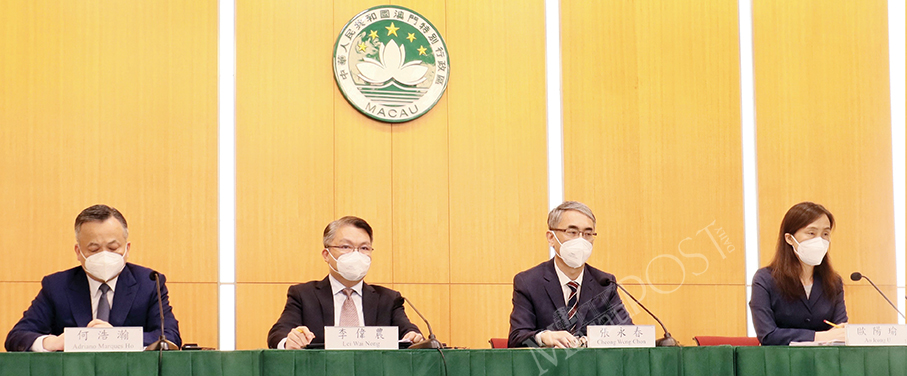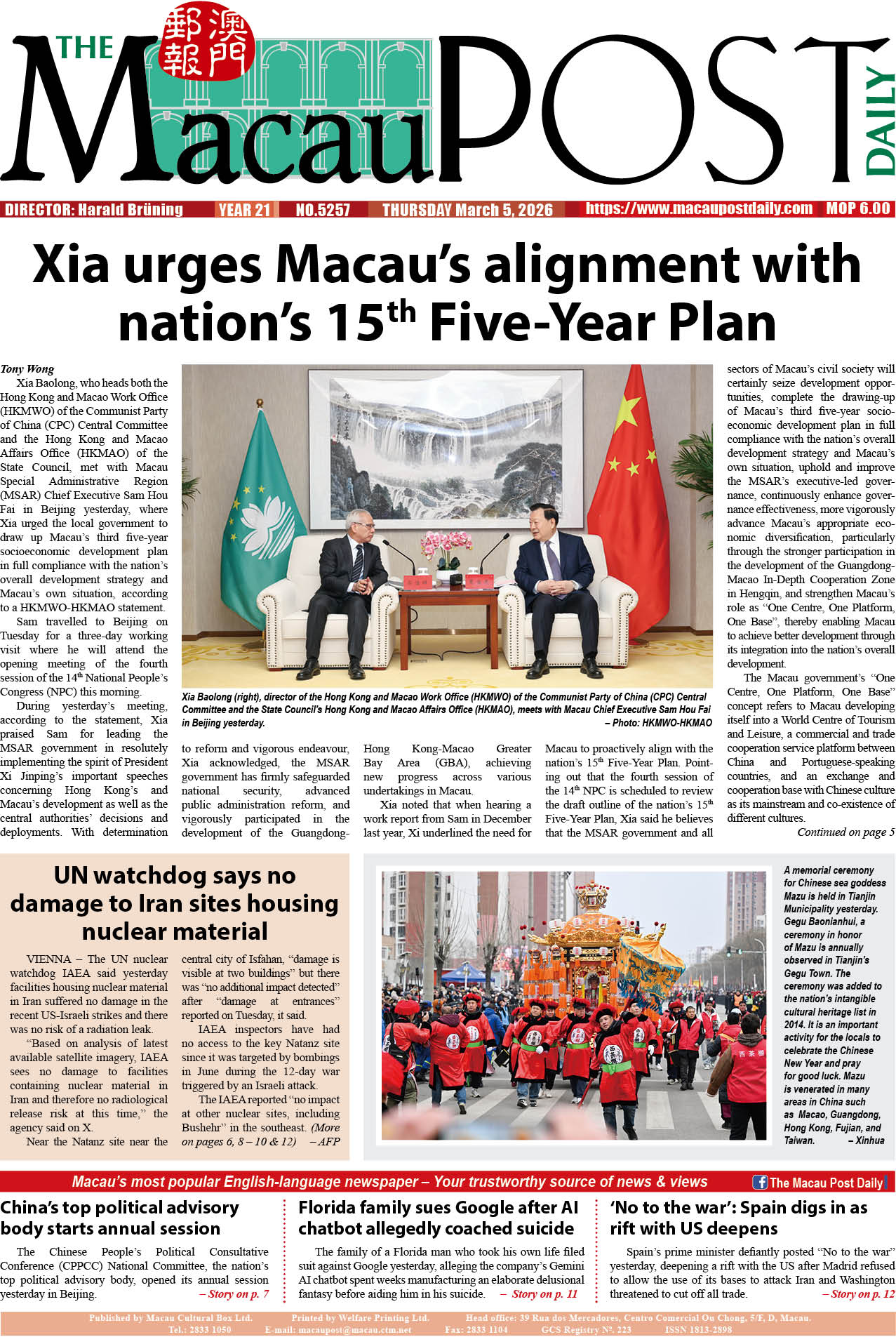The government’s Gaming Concession Public Tender Committee held a special press conference at Government Headquarters in Nam Van yesterday to announce details of the upcoming public tender for the city’s gaming concessions, which will require bidders to focus more on their non-gaming projects and plans how to attract more foreign visitors.
The committee is headed by Secretary for Administration and Justice André Cheong Weng Chon. The other members include Secretary for Economy and Finance Lei Wai Nong, Secretary for Social Affairs and Culture Elsie Ao Ieong U, Chief-of-Office of the Chief Executive’s Office Hoi Lai Fong, Macau Economic Services Bureau (DSE) Director Tai Kin Ip, Macau Government Tourism Office (MGTO) Director Maria Helena de Senna Fernandes, Gaming Inspection and Coordination Bureau (DICJ) Director Adriano Marques Ho, Judiciary Police (PJ) Director Sit Chong Meng, and Land and Urban Construction Bureau (DSSCU) Director Lai Weng Leong.
Cheong said that the committee’s composition is due to the fact that the upcoming bidding process will be closely related to the future policies of the local government, and also due to the fact that the current focus of Macau’s development is not on developing the gaming industry as an economic driver as it was 20 years ago, but now the focus is on expanding overseas markets.
Sector’s ‘unhealthy’ structure
Cheong pointed out that one of the biggest problems with the gaming industry is that the customer base is too homogeneous and the structure is considered “unhealthy”, so the tender will highly focus on the non-gaming elements of the bidders’ proposals and on helping local SMEs (small and medium enterprises) to develop.
The amended gaming law, which was promulgated earlier this summer, stipulates that a financial incentive will be offered to those gaming companies that attract more overseas gamblers by reducing their 5 percent levy (officially known as “contribution”) on their gross gaming revenue for supporting social welfare, urban development and other things in Macau, while in the previous law, the levy stood at 4 percent of gross gaming revenue.
Cheong underlined that this does not mean that the government has to wait until the new gaming concessions are granted – and which are slated to start operating on January 1 next year – to open up the overseas market, but rather that it depends on the government’s COVID-19 prevention and control measure and the pandemic’s development.
Acknowledging that no one can predict when the pandemic will end, Cheong said he believes it will “eventually pass” and that the government will continue to look for more measures to enable society to “return to normal”.
No ‘significant impact’ by COVID-19 on tender
Cheong said he believes that the current COVID-19 outbreak in Macau won’t have a “significant impact” on the public tender, as the government has been working on this for a long time.
As such, Lei said he hopes that the current anti-COVID-19 “consolidation period” will end as soon as possible so that Macau could enter a “stabilisation period” as soon as possible, when he expects tourists to “return” to Macau, as Macau is “quite an attractive” tourist destination, adding that “as long as we do a good job of COVID-19 prevention and control, our tourists will come back soon”.
Before the COVID-19 pandemic, mainland Chinese and Hongkongers accounted for about 70 percent and 20 percent of Macau’s visitor arrivals respectively.
Bidding for 48 days in 3 phases
Cheong noted that companies which are intending to participate in the upcoming public tender for Macau’s new gaming concessions can submit their bids from today until 5:45 p.m. on September 14, after which the committee will start to assess their “qualifications”, particularly whether their proposals provide measures to diversify Macau’s economy and turn the city into a world centre of tourism and leisure.
Lei added that corporate social responsibility (CSR) should also be laid out in the bidders’ proposals, including ensuring staff members’ employment and rights, as well as their upward mobility, as the bidding standards for the future gaming concessions.
Cheong said that the 48-day bidding would consist of three phases. He did not elaborate, but pointed out that two decades ago the bidding process lasted just 33 days.
Supplementary bids possible
If the requirements are not met, Cheong said, the bidders will be allowed to submit a supplementary bid, adding that eligible companies will be granted a provisional concession.
Cheong also said that bidders from overseas are welcome to submit their proposals.
Cheong noted that the government does not have a specific timetable for the bidding process, but he reaffirmed that the bidding process will be finished before the end of the year, so that the new gaming concessions could start operating right away.
Macau’s three gaming concessions and three sub-concession will expire at the end of the year.
All bidders to be treated equally
Still, Cheong underlined that he did not know how many companies will participate in the public tender or whether there will be any overseas bidders, but he stressed that the government will treat all the bidders equally, including Macau’s six current operators, when deciding on the new gaming concessions, adding that the government will “strictly adhere to the new gaming law” during the bidding process.
The six operators’ concessions and sub-concessions were extended last month until the end of the year. Cheong said the government has “fully prepared” for a smooth transition towards the new concessions so as not to affect casino operations and workers’ rights.
The new gaming law stipulates that the government can grant up to six gaming concessions by public and open tender for 10 years, with a possible extension of up to three years in exceptional circumstances.
‘Up to’ 6 successful bidders
Cheong emphasised that the “up-to-six” article in the new gaming law does not mean that the government must necessarily grant six gaming concessions, but rather that it depends on whether the bidders’ proposals fulfil the government’s requirements.
Meanwhile, a statement by the Macau Government Information Bureau (GCS) released after the conference said that the tender involved the granting of six concessions.
Currently, Macau’s gaming industry comprises three concessions (SJM, Galaxy and Wynn) and three sub-concessions (Sands, Melco and MGM). The three concessionaires sold one sub-concession each.
Sub-concessions are specifically banned by the new law.
10 million pataca bidding guarantee
All bidders must pay a guarantee of at least 10 million patacas.
As of the end of June, the gaming sector consisted of 37 casinos owned by the six rival operators – 20 by SJM, five by Sands, four each by Galaxy and Melco, and two each by Wynn and MGM. The sector comprised 6,006 gaming tables and 12,042 slot machines at the end of last month, according to data from the Gaming Inspection and Coordination Bureau (DICJ).
At the end of last year, the gaming sector had 54,839 full-time employees, accounting for 14.5 percent of Macau’s workforce at that time, according to the Statistics and Census Bureau (DSEC).
Back in 2001, when the government terminated the city’s long-running gaming monopoly, 21 bidders submitted their proposals, three of which were chosen by a public tender committee.
Concessions vs licences
Macau’s system of gaming concessions dates back to 1849. The concessions give the government much more leeway than conventional business licences. Gaming premises revert to the government when their operators’ concessions expire.

Secretary for Administration and Justice André Cheong Weng Chon (second from right) addresses yesterday’s special press conference at Government Headquarters in Praia Grande, while Secretary for Economy and Finance Lei Wai Nong (second from the left), Gaming Inspection and Coordination Bureau (DICJ) Director Adriano Marques Ho (first from the left) and Secretary for Social Affairs and Culture Elsie Ao Ieong U look on. Photo: Ginnie Liang







